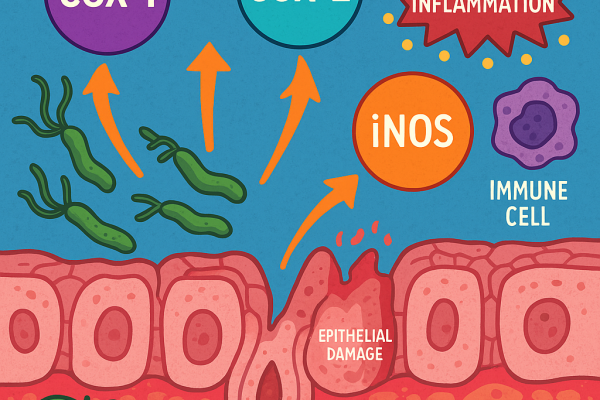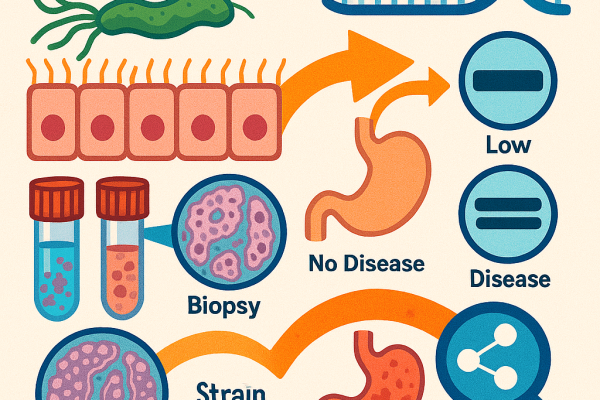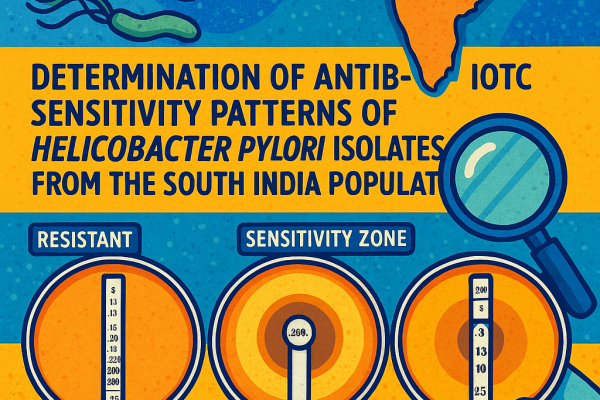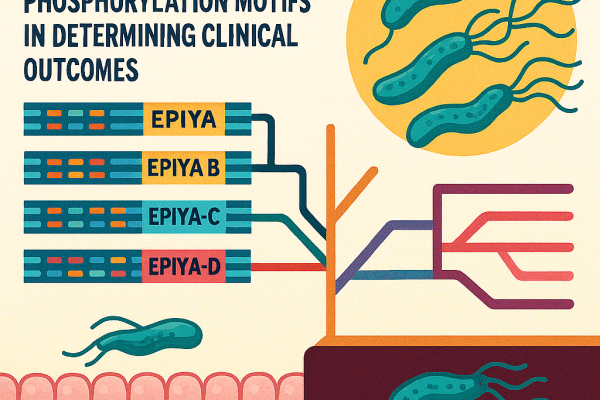Check Our H. Pylori Research Studies
At the Centre for Liver Research & Diagnostics, our commitment to advancing gastrointestinal and liver health is reflected in a series of impactful studies on Helicobacter pylori, a major contributor to gastric disorders worldwide. This research portfolio explores the bacterium’s molecular behavior, transmission pathways, clinical implications, and antibiotic resistance patterns—particularly within the Indian population.
Through cutting-edge genetic analysis and clinical correlation, these studies have uncovered how H. pylori influences host inflammatory responses, identified key virulence genes linked to disease severity, demonstrated the role of food hygiene in transmission and provided region-specific antibiotic sensitivity data to guide effective treatment.
These findings not only deepen scientific understanding but also support improved diagnostics, personalized therapies, and public health strategies. Together, they represent a significant contribution to microbiology, gastroenterology, and preventive medicine.

Microb Pathog. 2019; 135:103634
Gene expression patterns of COX-1, COX-2 and iNOS in H. Pylori infected histopathological conditions.Authors: Tiwari SK, Shaik AS, Shaik AP, Alyousef AA, Bardia A, Habeeb MA, Khan AA

Health, 2014; 6(4)
A study on the transmission of helicobacter pylori from food prepared and consumed under hygienic and unhygienic conditions: A first study using biopsy samples.Authors: Ahmed KS, Madompoyil B, Ahi JD, Khan AA, Tiwari SK, Habeeb MA

J Can Ther, 2013; 4(1A)
Studying the Importance of VacA Gene of Helicobacter pylori in Identifying the Pathogenicity of Strains by Comparing It with the Disease Status of the Subjects.Authors: Ahmed KS, Madompoyil B, Ghebremedhin AA, Issac J, Ahi JD, Khan AA, Tiwari SK

Advances in Microbiology, 2012, 2, 263-267
Determination of Antibiotic Sensitivity Pattern of Helicobacter pylori Isolates from South India Population by Epsilometer Test (E-Test).Authors: Khawaja Shakeel Ahmed, Anghesom Ambesajir Ghebremedhin, Aleem Ahmed Khan, Santosh K. Tiwari, J. D. Ahi, Irshad Ahmed

Genetics and Molecular Biology. 2011; 34(2): 280–285
Phylogenetic analysis based on EPIYA repeats in cagA gene of Indian Helicobacter pylori and implications of sequence variations in the tyrosine phosphorylation motifs in determining the clinical outcome.Authors: Santosh K. Tiwari, Vishwas Sharma, Manoj Gopi, Varun Kumar Sharma, Sivaram Gunisetty, Amrita Nandan, Saikant R, Avinash Bardia, Md. Aejaz Habeeb, Aleem A. Khan, CM Habibullah
Discuss With Us For Your Research Needs
Whether you’re starting a new research project or preparing for publication, our team is here to support you every step of the way. From topic selection and methodology guidance to journal recommendations and formatting assistance, we offer personalized consultations to help you achieve your academic goals. Let’s collaborate to turn your ideas into impactful research.
Leave Your Message
Impact of our Research
This body of work demonstrates a comprehensive and impactful approach to studying Helicobacter pylori, integrating molecular biology, clinical relevance, public health, and microbiological diagnostics. It has contributed meaningfully to both scientific literature and healthcare practices, particularly in the Indian context.
Molecular and Genetic Insights
The research showed how H. pylori alters host inflammatory genes and contributes to gastric diseases. It identified virulence genes (VacA and cagA) linked to strain-specific pathogenicity, aiding targeted diagnostics.
2011 - 2019
Public Health & Transmission
The study confirmed H. pylori transmission through food prepared under unhygienic conditions using biopsy samples. It highlighted the need for improved food hygiene to reduce infection risk.
2013 - 2014
Clinical Relevance & Diagnostics
Findings linked gene expression and virulence markers to disease severity, enabling risk-based patient stratification. This supports development of personalized diagnostics and treatment strategies.
2011 - 2019
Antibiotic Resistance & Treatment Strategies
The research identified resistance patterns in H. pylori strains from South India using E-Test. It guides clinicians in selecting effective antibiotics and supports regional stewardship efforts.
2011 - 2012
